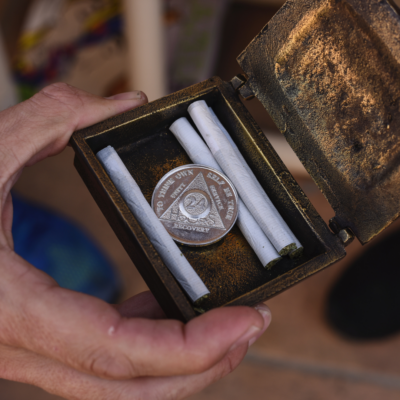7 Tips for Staying Sober

Whether you’ve done the work necessary to become sober or are still working toward that goal, you want to stay on the path toward long-term sobriety. However, because life happens, you can expect some challenges to come your way that might derail your progress. That’s why learning how to get and stay sober is essential.
Seven Tips to Help You Stay Sober
Consider these seven tips for staying sober that can lead to achieving and maintaining sobriety.
1. Care for Your Mental Health
When you struggle with mental health issues, it can be hard to focus on your sobriety. Whether you’ve been diagnosed with a mental condition like depression or stress overwhelms you, getting professional help is essential.
Working with a counselor or therapist helps you identify issues that hinder your progress and learn healthy ways to address them. Your counselor can assist you in seeking more intense treatment, such as a residential treatment program, when it appears you may be headed for a relapse.
2. Work on Your Relationships With Friends and Family
If substance use has strained your relationships with your family and friends, it’s never too late to renew those acquaintances. Friends and family often become discouraged and tired when trying to support an addicted loved one.
Addiction can take a toll on anyone it touches. No doubt your loved ones want to see you succeed and stay on the path to recovery, but when they’ve moved on, they may be reluctant to open themselves up to hurt and disappointment.
Family Counseling
One of the reasons family counseling and therapy is essential is because it offers a safe space for addressing family issues that arise from addiction. If you’ve gone through a 12-step program, you know that admitting wrongs and making amends to family members you’ve hurt are requirements for healing.
Family members hurt by substance use need the addicted loved one to acknowledge their pain. Building trust with loved ones means being honest and transparent with them and no longer blaming them or making excuses for substance misuse.
3. Focus on Healthy Relationships
As you recover, remember that going back to friends who participated in drinking or using with you is a sure way to relapse. Thinking you can go to a bar to hang out with old friends and not drink may be unrealistic. To be successful, surround yourself with like-minded people. Most likely, people you know who care for you want to help you stay sober.
Finding a social network of individuals who don’t drink or use drugs can be a start. Replacing old social activities with healthy alcohol-free alternatives can help build self-confidence and keep you committed to recovery.
4. Learn How to Do Fun Things Alone
Most of us find ourselves alone sometimes. However, being alone doesn’t equate to being lonely. Alone time can offer opportunities for rest and positive reflection. Keep a gratitude journal and take time to jot down the people and things that make you thankful. If you like fishing, jigsaw or crossword puzzles, you may be surprised when you get lost in these activities in a good way.
Create New Traditions
Look at ways to encourage others when you’re alone. Do you know people who may be sick or shut-in who’d enjoy a friendly phone call? How about writing a note or sending a card to someone who may be having a tough time?
Taking a walk, trying a new recipe or enrolling in a free class online are some alone-time activities that can be part of your self-care routine.
5. Find Ways to Cope If You Get Thrown Off Your Schedule
You may have a great routine that keeps you moving forward without alcohol or drugs. However, some events can throw you off your schedule. A stressful day at work, a negative comment from a loved one or craving just one drink are all events that can lead to relapse. The key is to use new knowledge, skills and resources to get through challenging times.
A sober friend or sponsor from your 12-step program can help you see that one mistake or trying time doesn’t define you, and you can reset and move forward.
6. Know What to Do If Your Old Triggers Reappear
The temptation to drink often comes from triggers that reappear as you go about your routines. If in the past watching sports or celebrating special occasions were reasons for drinking, those triggers can still impact you when you get sober.
Running into an old friend who’s having a drink with their meal at a restaurant may cause you to reminisce about the times you drank together. These triggers sometimes lead to cravings. However, if you’re patient, the desire to drink will pass.
Make a Plan and Stick to It
Plan ahead to deal with triggers before they occur. For example, bring a sober friend with you to social events. You won’t be the only person not drinking, and they can discourage you from giving in to cravings. Saying no to invitations when you know there will be drinking can help you remain sober.
Visualize Your Response
Visualize how you can handle the pressure or urge to take a drink. Remember that no one controls you, and think about the confidence and power you’ll feel when you take control and walk away from the situation.
7. Consider a Dual Diagnosis Program at Serenity Springs
Struggling with addiction is hard, but Serenity Springs has programs to help break the cycle. Like many people, you may have other issues that have made it hard for you to stop drinking or using drugs.
People who drink too much often deal with mental health conditions like anxiety disorders, depression and stress. You’ll work with a therapist and other mental health professionals to address mental health concerns during the recovery journey, which can help you focus on sobriety.
The staff at Serenity Springs Recovery is waiting to help you become sober and mentally healthy. Start the admission process online or call us at 386-423-4540.



